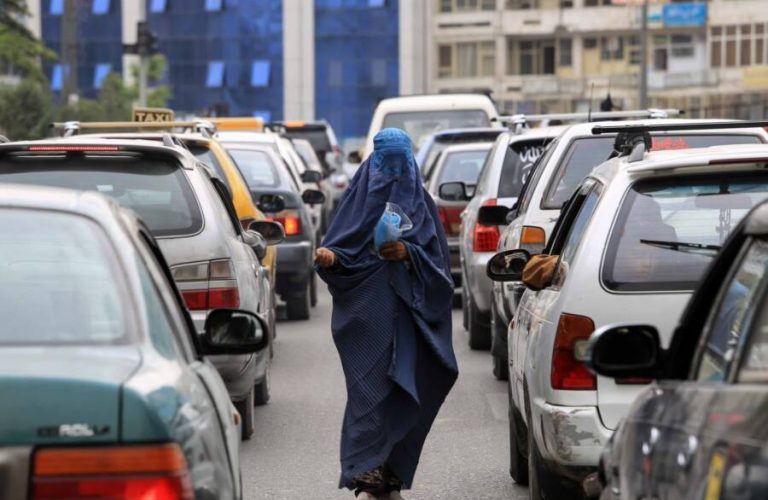Author: Mahdi Mozaffari
Since the takeover of the interim government in Afghanistan, the phenomenon of begging, which had previously existed to some extent in the country, has transformed into a widespread social crisis. Major cities, especially Kabul, have witnessed an unprecedented increase in the number of beggars. From young children to the elderly, everyone is seen on the streets and alleys of the city in search of a morsel of bread. This situation not only negatively impacts the appearance of cities but also reflects the deep poverty, unemployment, and insecurity that have overshadowed Afghanistan since the fall of the previous government. Women, children, and individuals addicted to drugs make up the majority of the begging population due to their heightened vulnerability. The widespread presence of child beggars in the streets indicates not only humanitarian and ethical concerns but also the failures of the educational system and social support.
Given the worsening situation and rising concerns about the social and economic consequences of this phenomenon, the interim government decided to take serious measures against begging in mid-2023. This decision aimed to establish order and security in cities while also alleviating pressure on public resources. Following a direct order from Hibatullah Akhundzada, the leader of the government, a comprehensive program was initiated to collect beggars from Kabul and subsequently other regions of the country. In this program, security forces collaborated with government agencies to identify and gather beggars.
Furthermore, the government aimed to address the issue of begging structurally by drafting and approving the “Law on Collecting Beggars and Preventing Begging.” This law recognizes begging as a crime and imposes heavy penalties, including imprisonment, for professional beggars. The goal of this legislation is to reduce the incentive for begging and direct individuals toward employment and productive activities. However, will this law and its surrounding issues effectively resolve the problems of poverty and begging in the country?
The Begging Crisis and Government Actions
With the re-establishment of the current government, Afghanistan has faced an unprecedented economic collapse that has plunged millions of families into poverty. International sanctions, recurring droughts, and severe restrictions imposed on women have all contributed to the exacerbation of this crisis. In such circumstances, many families have lost their ability to secure basic necessities and have been forced to resort to begging. The significant increase in the number of beggars on the streets of Afghan cities, particularly Kabul, symbolically reflects the dire economic and social situation in the country.
In response to the growing phenomenon of begging, the government took action to collect beggars from the streets. According to new laws, beggars who had turned to this practice due to extreme poverty and lack of income sources were recognized as “deserving beggars” and were supposed to receive support from the government. This support included financial assistance, identifying the root causes that led individuals to begging, and efforts to create job opportunities for them. However, published reports indicate that the implementation of these laws has faced numerous challenges. Statistics provided by the government suggest that tens of thousands of beggars have been collected, but there are no detailed accounts regarding the amount of financial aid given to these individuals or the measures taken to address the root problems of begging.

Roots and Solutions
Published statistics from the government paint a grim picture of the begging situation in Afghanistan. According to these statistics, begging has become a widespread social phenomenon, not only in Kabul but also in many other provinces such as Herat and Nangarhar. The data also indicates that orphaned children, individuals with addictions, and many others have turned to this shameful practice for various reasons, including poverty, unemployment, and lack of equal opportunities.
Sociologists trace the root causes of begging to the inability of governments to effectively manage the economy and combat poverty. In the case of Afghanistan, widespread poverty and unemployment are identified as the most significant factors exacerbating this phenomenon. Many individuals are forced to beg due to the lack of suitable jobs and sufficient income to meet their basic needs and those of their families.
Despite the caretaker government’s efforts to collect beggars, these actions have not yielded effective results so far. Superficial and temporary measures cannot resolve an issue rooted in the economic and social structures of society. To address the phenomenon of begging, a comprehensive and long-term approach is needed that tackles the underlying causes of this problem. This program should be based on field studies and consider the specific conditions of Afghanistan. Some of the most important actions that can be taken in this regard include:
Economic Development: Economic development in Afghanistan is key to the prosperity of the country and improving the livelihoods of its people. Creating sustainable job opportunities with adequate income through support for the private sector and investment in small and medium-sized enterprises can significantly help reduce high rates of unemployment and poverty. The Afghan government can facilitate attracting domestic and foreign investors by creating a safe and stable environment for investment.
Investment in infrastructure such as roads, energy, and communications will not only increase productivity but also contribute to rural development and reduce regional inequalities. Additionally, supporting agriculture and handicrafts that utilize Afghanistan’s natural resources can help create added value and boost exports of domestically produced goods. Finally, developing vocational training programs and enhancing the skill levels of the workforce are other key factors for achieving sustainable economic growth and creating employment in Afghanistan.
Support for Vulnerable Groups
Supporting vulnerable groups, especially women, children, individuals with disabilities, and the elderly—who are at greater risk of poverty and hunger due to various reasons such as gender discrimination, physical limitations, or aging—is both essential and humane. Providing comprehensive support services to these groups, including targeted financial assistance, easy access to healthcare services, vocational training tailored to individual needs and abilities, and the creation of employment opportunities, can significantly improve their quality of life and reduce begging as an inevitable consequence of poverty.
Furthermore, strengthening social and economic infrastructure, such as ensuring adequate housing, access to clean water and sanitation, and establishing social support networks, can help reduce the vulnerability of these groups to economic and social shocks and enhance their resilience. Ultimately, the active participation of civil society and non-governmental organizations alongside the government can play a crucial role in accurately identifying the needs of these groups, designing and implementing effective support programs, and monitoring the execution of these initiatives.
Combating Corruption and Fair Distribution of Resources
A serious fight against administrative and economic corruption is key to improving the fair distribution of resources and reducing the deep gaps of social inequalities. Corruption, like a devastating scourge, has rooted itself in all layers of society and creates a vicious cycle that hinders sustainable growth and development. When public resources flow into the pockets of a select few instead of serving the entire community, class divisions deepen, and public trust in governmental institutions is severely undermined.
By clarifying administrative processes, strengthening public oversight, and enforcing strict laws against violators, it is possible to gradually eradicate corruption and create a foundation for the fair distribution of opportunities and resources. Reducing corruption not only improves the economic status of society but also increases public participation in civic affairs, strengthens the spirit of justice-seeking, and ultimately contributes to the establishment of a healthy and dynamic community.













